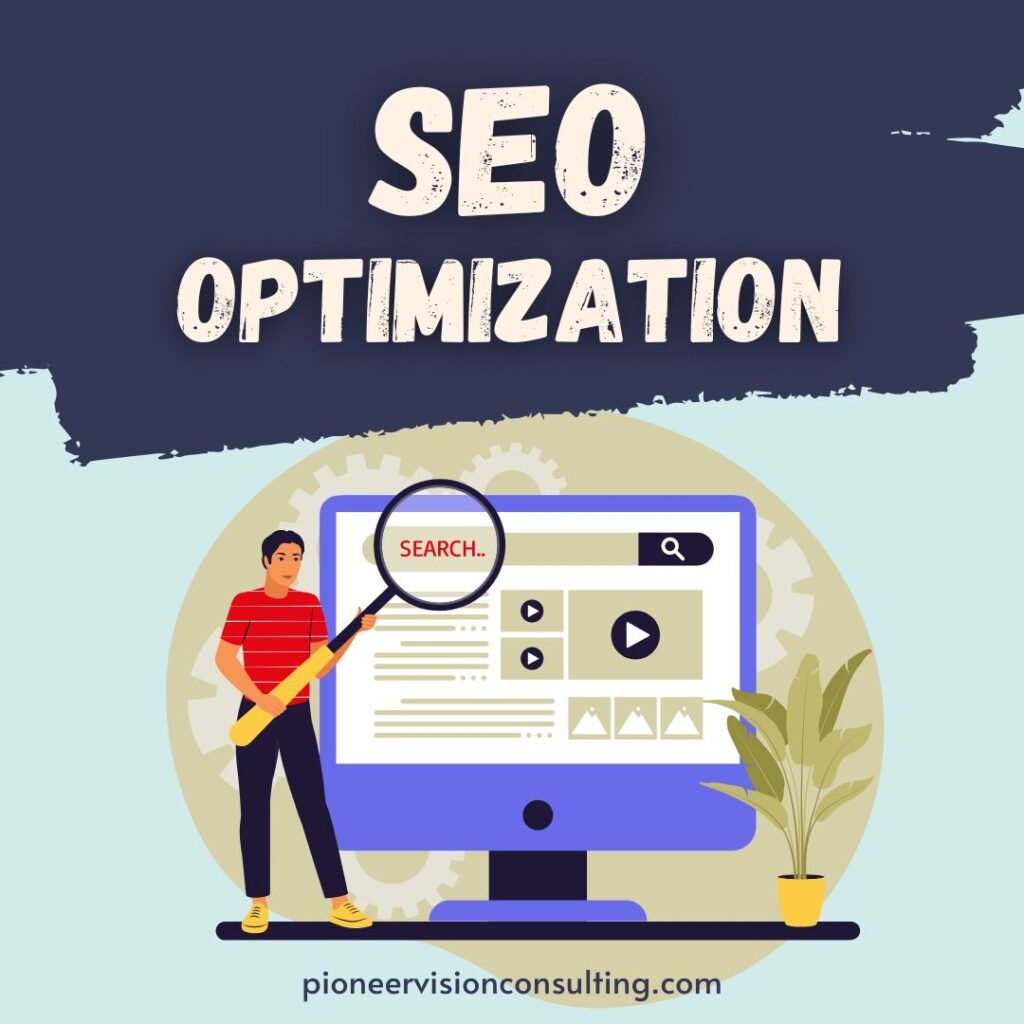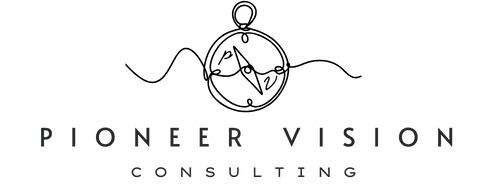In the digital age, visibility is key. It’s not enough to have a website or an online presence. You need to be seen.
This is where Search Engine Optimization, or SEO, comes into play.
SEO is a crucial aspect of digital marketing. It’s the practice of optimizing your website to increase its visibility in search engine results pages (SERPs). But why is SEO important?

The primary goal of SEO is to drive organic traffic to your website. This type of traffic is valuable because it’s targeted. It’s made up of people who are actively searching for the products or services you offer.
And when you attract targeted traffic, you increase your chances of conversions. That’s why SEO is often seen as a cost-effective strategy compared to paid advertising.
But SEO isn’t just about driving traffic. It’s also about establishing brand authority and trust. When your website ranks high in SERPs, it sends a signal to users that you’re a reputable source of information.
SEO also requires a deep understanding of search engine algorithms. These algorithms are constantly changing, and your SEO strategies need to evolve with them.
This means that SEO isn’t a one-time effort. It’s a continuous process that requires constant monitoring and tweaking.
But the rewards are worth it. A well-executed SEO strategy can provide long-term results and a sustainable online presence.
In this article, we’ll delve deeper into why SEO is important. We’ll explore its role in digital marketing, its impact on business growth, and how it can give you an edge over your competitors.
Whether you’re a business owner, a marketer, or just someone interested in improving your website’s performance, this article is for you. Let’s get started.
Understanding SEO and Its Fundamentals
SEO stands for Search Engine Optimization, a pivotal part of digital marketing. Its core purpose is to enhance a website’s visibility, making it more likely to appear in search engine results.
SEO is not limited to just increasing traffic; it focuses on attracting quality visitors. This means reaching individuals genuinely interested in your offerings.
In essence, SEO involves optimizing various elements of your website. This includes your site’s content, design, and technical aspects, all orchestrated to align with search engine guidelines.
The ultimate objective is to create a user-friendly and engaging website. When executed well, SEO can lead to a better user experience and increased credibility.
Moreover, SEO is a constantly evolving field. As search engines like Google update their algorithms, SEO strategies must adapt. To succeed, continuous monitoring and learning are essential.
What is SEO?
Search Engine Optimization, or SEO, is the practice of enhancing a website’s online presence. It aims to rank higher in search engine results, thus reaching more potential users.
The process includes various strategies and techniques. On-page SEO focuses on the content and layout of your web pages. Off-page SEO involves activities like link building to enhance a site’s credibility.
Technical SEO ensures a website is easily crawlable and indexable by search engines. It addresses aspects like loading speed and mobile-friendliness. Together, these elements form a comprehensive SEO strategy.
How Do Search Engines Work?
Search engines like Google use complex algorithms to provide users with the most relevant results. This involves crawling the web, indexing content, and ranking pages based on numerous factors.
When a search engine ‘crawls’ the web, it follows links to discover new pages. It stores the information it finds in an index, a massive database of web content.
Ranking is where the magic happens. Based on the algorithm’s criteria, search engines determine which pages best answer user queries. Factors include relevance, quality of content, and site authority.
Understanding this process is crucial for effective SEO. By optimizing your website according to these factors, you can improve your rankings. The goal is to ensure that search engines recognize your site as a valuable resource for users.
The Role of SEO in Digital Marketing
SEO plays an essential role in digital marketing. It is the backbone that supports your website’s visibility and searchability. A well-executed SEO strategy can attract a steady stream of organic traffic, which is often more valuable than paid traffic.
Digital marketing encompasses many strategies, and SEO complements them all. It works hand in hand with content marketing by targeting specific keywords and enhancing content visibility. SEO also supports social media efforts by increasing content shareability and reach.
Furthermore, SEO can improve email marketing campaigns. By driving targeted traffic to optimized landing pages, it ensures higher engagement and conversion rates. The synergy between SEO and these strategies creates a robust marketing framework.
The impact of SEO in digital marketing extends to brand authority. High search rankings can instill trust among users. This trust translates into greater credibility, encouraging potential customers to engage with your brand.

SEO’s influence is profound and spans across every aspect of digital marketing. Its role is not just limited to increasing website visibility. It is also instrumental in enhancing user experience and driving strategic growth.
Integrating SEO with Other Marketing Strategies
Integrating SEO with other marketing strategies requires a seamless approach. The focus should be on creating cohesive messaging and ensuring alignment across all channels. When SEO blends with content marketing, it emphasizes relevant keywords and audience interests.
Combining SEO with social media strategies can magnify results. Social platforms can drive traffic to optimized content, boosting site engagement. Meanwhile, SEO optimization can enhance visibility in social searches, creating a reciprocal effect.
Combining SEO with PPC (pay-per-click) advertising can also be powerful. A comprehensive approach can capture both organic and paid search traffic. This holistic strategy ensures no opportunity is left untapped, maximizing overall marketing success.
The Importance of SEO for Business Growth
Investing in SEO can significantly impact business growth. It enhances online visibility and can increase both traffic and conversions. For many businesses, the importance of SEO cannot be understated.
A strong SEO strategy helps businesses attract more users who are actively searching for their products or services. By optimizing content and site structure, businesses can improve user experiences and conversion rates.
Here are some reasons why SEO is essential for business growth:
- Increases organic traffic, which is more likely to convert
- Improves brand recognition by enhancing search engine rankings
- Builds long-term trust and credibility with customers
- Reduces dependency on paid advertising channels
- Offers measurable results with analytics to refine strategies
 by Charles Forerunner (https://unsplash.com/@charles_forerunner)
by Charles Forerunner (https://unsplash.com/@charles_forerunner)
SEO also enables businesses to tap into new markets by targeting keywords and phrases that align with consumer interests. It offers a cost-effective way of reaching potential customers who are already interested in your offerings.
The integration of local SEO strategies can drive foot traffic to physical locations. This localized approach to search ensures that your business is visible to users searching within your geographical area.
Establishing Brand Authority and Trust
SEO plays a crucial role in building brand authority. Achieving high rankings in search engine results pages signifies that your site is trusted by Google. This perceived trust enhances the credibility of your business with potential customers.
When users see your site consistently ranked at the top, they associate it with quality. This perception strengthens over time, turning visitors into loyal customers. Moreover, SEO efforts contribute to creating high-quality content that positions your brand as an industry expert.
Providing valuable content attracts backlinks from other reputable sites. These links act as votes of confidence and further establish your business as a trusted source. Achieving this authority not only boosts rankings but also fosters long-term trust with your audience.
An SEO strategy that emphasizes brand authority can differentiate your business. Users gravitate towards brands they trust, translating into higher engagement and better retention rates. Trust and authority are invaluable assets that drive sustained growth.
Outranking Competitors in SERPs
In the competitive digital landscape, outranking competitors is vital. SEO is your tool to ensure your business appears above the competition. High rankings mean increased exposure and opportunities for conversions.
Effective SEO can differentiate your business and make it stand out in crowded markets. By targeting strategic keywords, you capture traffic that competitors might overlook. This competitive edge can expand your market share and drive growth.
A thorough understanding of competitor strategies is also critical. SEO helps you stay informed of industry trends and competitor behavior, allowing you to pivot and adapt. Reacting swiftly to changes can be the difference between leading the pack or playing catch-up.
Moreover, outranking your competitors increases brand visibility and share of voice. Users tend to trust and choose brands that appear at the top of SERPs. Prioritizing SEO ensures that your brand remains in the spotlight and ahead of the competition.
SEO as a Cost-Effective Strategy
Investing in SEO can provide long-term benefits without the recurring costs of traditional advertising. Unlike paid ads, which require continuous funding, SEO builds enduring visibility. Over time, this reduces marketing expenses and enhances ROI.
SEO emphasizes organic growth by improving website content and structure. This organic approach leads to a sustainable increase in traffic and conversions. Businesses benefit from lasting results, even after initial optimization efforts.
Furthermore, SEO helps businesses connect with users actively seeking their products or services. This targeted approach captures high-intent users, making them more likely to convert. By focusing on relevance and quality, SEO reduces the cost per acquisition.
Additionally, SEO allows for a strategic allocation of resources by identifying high-performing keywords and opportunities. By optimizing for these areas, businesses can capitalize on trends and shifts in consumer behavior without high costs. In turn, this strategy maximizes impact while minimizing expenditure.
Comparing SEO with Paid Advertising
Paid advertising is often associated with immediate visibility. However, it requires a constant financial commitment to maintain momentum. Once the budget stops, so does the traffic.
In contrast, SEO builds organic traffic over time, creating lasting benefits. While it may take longer to see results, those results are more sustainable. SEO enhances your site’s foundation, offering lasting organic visibility and credibility.
SEO is particularly beneficial for businesses seeking cost-effective growth. While paid ads can complement SEO efforts, relying solely on them can become costly. SEO provides an alternative that leverages content and user intent for long-term gain.
Driving Organic Traffic and Conversion Rates
Driving organic traffic is a cornerstone of SEO, crucial for conversion. When your site appears in search results, it attracts relevant visitors. These users are actively searching for products or services like yours.
SEO helps convert these visitors into customers by optimizing for targeted keywords. This ensures your site attracts users more likely to engage and convert. High-quality content tailored to user intent is key to achieving this.
Additionally, organic traffic is stable and dependable. Unlike paid traffic, it doesn’t fluctuate with budget changes. A strong SEO strategy can boost your site’s visibility, driving consistent visitor flows over time.
Another advantage of organic traffic is the credibility it brings. Users trust sites that appear naturally in search results more than ads. This trust translates into higher conversion rates.
Ultimately, SEO boosts your business by driving targeted traffic and enhancing conversion potential. It aligns with search intent and improves user experience. This alignment increases the likelihood of turning visitors into loyal customers.
The Value of Targeted Traffic
Targeted traffic refers to visitors who match your business’s ideal customer profile. Such traffic has a higher potential for conversion since these users have specific needs. SEO plays a crucial role in attracting targeted traffic by leveraging relevant keywords.
By optimizing for specific search queries, SEO ensures your site meets user expectations. It bridges the gap between what users search for and the solutions you offer. This relevance increases engagement and reduces bounce rates.
Moreover, targeted traffic often leads to repeat visits and brand loyalty. Users who find your content useful are more likely to return and recommend. SEO helps your site capture this valuable audience segment, enhancing overall business growth.
SEO and User Experience (UX)
User experience (UX) is an integral part of SEO. Search engines prioritize sites that provide excellent UX, as it signals quality and relevance. This means a well-optimized site not only ranks better but also offers superior usability.
Improving UX involves several SEO practices, such as fast loading times and mobile optimization. Users expect quick access to information, especially on mobile devices. SEO ensures your site meets these expectations by streamlining navigation and readability.
Additionally, a clean, intuitive design supports SEO efforts by encouraging longer dwell times. This engagement metric is an indicator of content relevance to search engines, positively impacting rankings.
SEO also involves structuring content logically with clear headings and calls-to-action. This organization helps users find what they need efficiently, enhancing their overall experience. The seamless journey through your site translates to higher user satisfaction and improved rankings.
Lastly, incorporating user feedback and analytics can refine UX further. By understanding user behavior, you can tailor your site to better meet their needs, optimizing both SEO and UX in tandem.
SEO Strategies for Sustainable Online Presence
Building a sustainable online presence requires a well-rounded SEO strategy. This means focusing on more than just immediate results. SEO offers long-term visibility when executed with a comprehensive approach.
First, content quality cannot be overstated. Your content should be relevant and evergreen, providing value over time. Regular updates ensure that it remains current and continues to engage audiences.
Next, link building is essential for sustainability. Quality backlinks from reputable sources improve authority. Consistent link strategies help maintain and grow your site’s search visibility.
Additionally, aligning SEO with your overall brand narrative helps drive consistency. Clear messaging across content types and platforms reinforces your brand identity. This alignment enhances your site’s credibility in search results.
A structured plan that adapts to algorithm changes is crucial. Search engines frequently update their algorithms to improve user satisfaction. Staying informed and flexible keeps your SEO efforts effective and sustainable.
Finally, performance monitoring helps refine strategies. Regular analysis of key metrics guides adjustments and highlights areas for improvement. This proactive approach ensures a lasting online presence.
- Focus on content quality and relevance
- Implement a consistent link building strategy
- Align SEO with brand messaging
- Stay informed about algorithm updates
- Monitor performance metrics for ongoing improvement
Long-Term Results and Adaptation to Algorithm Changes
SEO’s true power lies in its ability to deliver lasting outcomes. Unlike short-lived tactics, SEO builds on itself, creating a sustainable web presence. This long-term focus enhances trust and authority in your niche.
Search engines continuously refine algorithms to improve search quality. To maintain rankings, adapt to these updates promptly. Being flexible helps you embrace changes without disruption.
Staying informed about algorithm trends is vital. This knowledge allows for tweaks that align with new requirements. Regular audits ensure your site meets evolving SEO standards.
Ultimately, the commitment to ongoing adaptation pays off. By adjusting strategies in response to algorithm shifts, your site retains visibility. This adaptability is key to a resilient SEO approach that withstands time.
Adaptation also involves reassessing keyword strategies and user intent. Changes in search behaviors can shift rankings, so understanding these trends is essential. Regularly revisiting and updating your tactics ensures alignment with your audience’s needs and search engine criteria.
Key Components of an Effective SEO Strategy
An effective SEO strategy hinges on multiple components working in harmony. Each element plays a pivotal role in your site’s performance. Understanding these components is crucial for achieving optimal results.
First, identify and prioritize target keywords. This foundation influences your entire content strategy. Keywords connect your site to user queries and search algorithms.
Next, content creation is key to engaging users. High-quality, relevant content answers user questions. It’s essential for attracting and retaining organic traffic.
Additionally, on-page and off-page optimizations are vital. On-page involves website elements you control. Off-page focuses on external signals like backlinks, impacting your site’s authority.
Furthermore, technical SEO ensures your site is crawlable. This includes optimizing site speed, structure, and mobile usability. Technical aspects support user experience and search engine indexing.
Local and global SEO tactics are equally important. Local SEO targets geographic areas, enhancing local business visibility. Global SEO helps reach audiences beyond geographic boundaries.
Effective SEO continuously adapts to changes in technology and user behavior. By integrating these components, you build a robust strategy. This strategic blend forms the backbone of a successful online presence.
- Prioritize target keywords
- Engage users with high-quality content
- Optimize on-page and off-page elements
- Ensure site technical performance
- Target both local and global audiences

Keyword Research and Content Creation
Keyword research is foundational in SEO. It starts with understanding what your audience searches for. Tools and analytics help identify valuable keywords that align with search intent.
Once you gather keywords, integrate them naturally into your content. However, avoid overstuffing them. Focus on providing insightful, engaging, and valuable information.
Effective content creation involves writing for both users and search engines. Your content should answer questions and solve problems. This approach makes your site a reliable resource.
Updating your content regularly keeps it relevant. Fresh information appeals to both users and search engines. The dynamic nature of content ensures continued visibility and engagement.
On-Page and Off-Page Optimization
On-page optimization involves refining the elements within your website. This includes using clear meta tags and headings. Structure and clarity guide search engines and users alike.
Ensure that your content is organized and formatted for readability. Proper HTML tags and intuitive navigation help both humans and bots. This clarity boosts engagement and ranking.
Off-page optimization focuses on external factors influencing your site. Backlinks from high-authority sites amplify your credibility. Quality links signal to search engines that your content is trustworthy.
In addition, engaging on social platforms can drive traffic to your site. Social signals contribute to building a robust backlink profile. This increases overall visibility and enhances off-page efforts.
Technical SEO and Mobile Optimization
Technical SEO is about ensuring your site is easily navigable by search engines. This includes using clean code and optimizing page load speeds. Fast, efficient sites keep users engaged and reduce bounce rates.
Mobile optimization is particularly crucial. With more users browsing on mobile, having a responsive design is essential. Your site’s design should adapt seamlessly to all screen sizes.
Technical SEO also involves maintaining a secure site. HTTPS encryption reassures users about data safety. Security adds a layer of trust that supports user interaction and search rankings.
Site architecture also plays a role. A well-structured site enhances crawlability and indexation. Proper layout guides users through your content intuitively, improving user experience and SEO outcomes.
Local SEO and Global Reach
Local SEO focuses on improving visibility within geographic areas. It’s essential for businesses that serve local customers. Strategies like optimizing Google My Business help connect with nearby audiences.
Citations and local reviews are pivotal in building local SEO. These elements corroborate your business’s legitimacy. Consistent information enhances your chance of appearing in local searches.
Global reach focuses on audiences beyond geographical limits. Targeting international keywords and creating multilingual content can extend your impact. A global approach taps into diverse markets.
Balancing local and global efforts is key. Both play integral roles in your comprehensive SEO strategy. They ensure your business meets diverse market demands and capitalizes on regional and international opportunities.
Measuring SEO Success and ROI
Measuring SEO success involves tracking key metrics that reflect performance. It goes beyond sheer traffic numbers. The focus should be on understanding user engagement and conversion rates.
Return on investment (ROI) is a crucial metric. Determining ROI helps evaluate the cost-effectiveness of your SEO strategy. It reflects how well your efforts translate into financial success.
Tools like Google Analytics offer valuable insights. These tools track user behavior, showing how visitors interact with your site. Analyzing this data helps refine your strategy.
Moreover, measuring SEO success is an ongoing process. Continuous monitoring allows for timely adjustments. This adaptability ensures your strategy remains aligned with business goals and market trends.
SEO Analytics and Performance Tracking
SEO analytics involves collecting data to assess site performance. Metrics like bounce rates, session duration, and page views are vital. They offer insights into user engagement and site effectiveness.
Performance tracking extends to keyword rankings. Keeping an eye on your position in SERPs is essential. It helps identify areas needing improvement and shifts in keyword effectiveness.
Regular reporting is crucial in performance tracking. Sharing SEO insights with your team promotes informed decision-making. This collaboration ensures a unified approach to optimizing site outcomes.
SEO Trends and Future Outlook
SEO is an ever-evolving field. Staying informed about trends is essential for maintaining a competitive edge. Emerging patterns in search behavior and technology will shape SEO’s future.
One significant trend is voice search. As smart speakers become more common, optimizing content for voice queries is vital. This trend shifts the focus to natural language and question-based queries.
Artificial intelligence (AI) also plays a growing role in SEO. AI algorithms are improving search accuracy and user satisfaction. Understanding how AI impacts ranking factors can guide future strategies.
Mobile-first indexing is another key trend. Google prioritizes mobile-friendly sites, reflecting the rise of mobile browsing. Ensuring a seamless mobile experience is no longer optional.
Additionally, privacy concerns influence SEO. With stricter data regulations, transparency and security are paramount. Building trust with users will be more crucial than ever.

Adapting to Search Behavior and Technology
Adapting to evolving search behaviors is vital. Consumers are becoming more tech-savvy, influencing how they search. This requires businesses to stay agile in their SEO approaches.
One aspect to consider is the rise of visual search technology. Users increasingly rely on images to find information. Optimizing images for search and incorporating visual content is essential.
Personalization continues to shape search experiences. Tailored content based on user preferences enhances engagement. Leveraging data analytics helps create more personalized experiences.
Finally, the integration of the Internet of Things (IoT) offers new opportunities. IoT devices are changing how users interact with technology. This shift necessitates innovative approaches to SEO strategies.
Embracing these changes requires a forward-thinking mindset. Businesses must stay informed and ready to implement new tactics. This proactive approach ensures long-term success in the digital landscape.
Implementing SEO: DIY or Professional Help?
Deciding between DIY and professional SEO help depends on various factors. Your expertise, resources, and business needs should guide your decision. Each option has distinct benefits and challenges.
DIY SEO allows greater control over strategies. It can also be more cost-effective. However, it requires a substantial time commitment. It also demands a deep understanding of SEO principles and trends.
Professional SEO services offer expert insight and proven methods. Agencies can implement comprehensive strategies efficiently. They stay updated on the latest algorithm changes and industry trends.
However, hiring an agency involves higher upfront costs. It’s important to choose a reputable provider. Always ensure they use ethical, white-hat SEO practices.

When to Consider an SEO Agency
Consider hiring an SEO agency if your resources are limited. They can save time and ensure effective implementation. Agencies are beneficial for businesses that lack in-house expertise.
Complex sites or those targeting competitive industries often need professional help. Agencies have the experience to tackle challenging SEO environments. Their strategic approach can boost your site’s performance.
Also, if you need faster results, an agency might be your best option. They have a streamlined process and the tools necessary for success. Weigh the pros and cons to make an informed decision.
Conclusion: The Compounding Benefits of SEO
SEO is not just a one-time effort; it’s a continuous process that brings cumulative benefits. As you optimize your site, improvements stack over time. This compounding effect strengthens your online presence.
A well-implemented SEO strategy leads to consistent organic traffic growth. Over time, this traffic becomes more targeted and reliable. It improves engagement and increases conversion rates, adding real value.
The importance of SEO extends beyond immediate results. Each effort enhances your authority and trust with both users and search engines. This position strengthens your brand and keeps your website competitive.
By continuously adapting to trends and algorithms, SEO ensures long-term visibility and success. The investment in SEO compounds into sustainable growth. It’s a strategic imperative for businesses aiming for a competitive edge in the digital landscape.
FAQs About SEO
What does SEO stand for?
SEO stands for Search Engine Optimization. It’s the practice of enhancing a website to increase its visibility in search engines.
Why is SEO important?
SEO is crucial for driving organic traffic to your website. It helps in improving your site’s ranking on search engines.
How does SEO differ from paid advertising?
Unlike paid ads, SEO focuses on organic search results. It builds long-term visibility without paying for each click.
What are the main components of SEO?
The main components include keyword research, on-page SEO, off-page SEO, and technical SEO. These elements work together to boost rankings.
How often should SEO be updated?
SEO should be continuously monitored and updated. Search engine algorithms change frequently, and SEO strategies need to evolve too.
Can anyone implement SEO?
Yes, anyone can implement basic SEO strategies. However, complex strategies might require professional help.
How long does it take to see results from SEO?
SEO is a long-term strategy. It typically takes several months to see significant results. Patience and consistency are key.
Is SEO cost-effective?
Yes, SEO is often more cost-effective than paid advertising. It provides sustainable results over time without ongoing costs.
How does SEO impact user experience?
SEO improves user experience by making websites more navigable and relevant. A better user experience leads to higher engagement.
Does SEO work for all types of websites?
Yes, SEO is beneficial for all types of websites, whether e-commerce, blogs, or service-based sites. Every site can benefit from improved search visibility.
Can SEO improve conversion rates?
Yes, by driving targeted traffic, SEO can increase conversion rates. Visitors that find you organically are often more engaged.
What is local SEO?
Local SEO focuses on optimizing a website for local search results. It helps businesses attract local customers.
How do search engines determine rankings?
Search engines use algorithms considering factors like content quality, user experience, and relevance. Optimizing these can improve rankings.
What are backlinks and why are they important?
Backlinks are links from other sites to yours. They signal to search engines that your content is trustworthy and authoritative.
Can social media influence SEO?
While social media itself doesn’t directly affect SEO, it can drive traffic and increase brand exposure, indirectly benefiting SEO efforts.
Should SEO be outsourced or done in-house?
The choice depends on your resources and expertise. Both options have pros and cons. Outsourcing offers expert insights, while in-house allows complete control.Contact us today to find out about our SEO services and how we can help you go up the ladder in search engines. Let’s make your dream a reality together!








